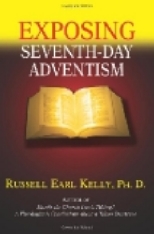BY RUSSELL KELLY
It grew great, even to the host of heaven. And some of the host and some of the stars it threw down to the ground and trampled on them. It became great, even as great as the Prince of the host. And the regular burnt offering was taken away from him, and the place of his sanctuary was overthrown. And a host will be given over to it together with the regular burnt offering because of transgression, and it will throw truth to the ground, and it will act and prosper. Then I heard a holy one speaking, and another holy one said to the one who spoke, “For how long is the vision concerning the regular burnt offering, the transgression that makes desolate, and the giving over of the sanctuary and host to be trampled underfoot?” And he said to me, “For 2,300 evenings and mornings. Then the sanctuary shall be restored to its rightful state” (Dan. 8:10-14).
An angel asks a question in Daniel 8:13, and Adventists try to explain the answer given in 8:14 this way: in 1844, Jesus opened the books of heaven, which contain the names and deeds of all who professed faith, and began judging, or investigating, only professed believers. This judgment is to determine who is worthy of being saved and re-created from the annihilation of “soul sleep”.
Five errors in the Adventist doctrine
There are at least five grammatical and contextual errors in the Adventist doctrine which render their explanation of Daniel 8:14 irrelevant and incorrect.
- First: Instead of answering how long until the vision of 8:8-12 would end, the Adventist answer tells when Christ would begin to cleanse the heavenly sanctuary and ignores the question about the vision.
- Second: Instead of answering when the daily sacrifice from 8:11 would be restored, the Adventist answer tells when the final phase of Christ’s ministry would begin in heaven (although He has continued a ministry in heaven since His ascension). Adventism does not address the question of the daily sacrifice.
- Third: Instead of answering when the little horn of 8:10-12 will stop persecuting the saints, the Adventist answer tells us when Christ will begin blotting out the sins of the saints. Moreover, they tell us those sins have caused the desolation of the heavenly sanctuary since Adam’s first sin. Instead of being a judgment of the little horn, the investigative judgment is a judgment of professed believers.
- Fourth: Instead of answering when the sanctuary will finally be cleansed from defilement by the little horn in 8:10-12, the Adventist answer tells us when Christ will move from one room into another in the heavenly sanctuary and finally begin cleansing the Most Holy Place. Again, instead of cleansing the sanctuary from its desolation by the little horn, Adventism requires cleansing heaven from the sins of God’s own people.
- Fifth: Instead of answering when the host (God’s people) will stop being persecuted by the little horn, the Adventist answer blames the desolation of the heavenly sanctuary on the confessed sins of the host.
Therefore, incredible as it sounds, one must conclude that the Adventist explanation of 8:14 to the question asked in 8:13 has absolutely nothing to do with the context in 8:8-12! Historically, the answer provided in most commentaries to the question asked in 8:13 is very simple: After 2300 literal sacrificial days [or sacrifices—see “Antiochus Epiphanes: is he the little horn?”, Proclamation!, Spring, 2014] in 164 B. C., the Jews won their civil war against Antiochus IV, restored the sanctuary, and gained their independence for the first time since 586 B. C. What a tremendously important historical event! The Jewish temple in Jerusalem was cleansed, restored, or rededicated to resume offering the daily sacrifices.

Today this restoration is still celebrated by the Jewish holy day called Hanukkah, meaning dedication. Also, this was a normal cleansing, and not a special Day of Atonement-type cleansing. †
Russell Kelly pastored SDA churches in North Dakota and South Carolina before leaving Adventism in 1982. He received a PhD in Theology in 2001 and has written three books. Russ lives in retirement in Washington, Georgia. This article is excerpted from Kelly’s book Exposing Seventh-day Adventism and is available through most internet book stores.
- Who’s Teaching Another Gospel? - July 3, 2025
- Worship Jesus Because He Is - June 5, 2025
- Giving Up the Family Altar - May 29, 2025
